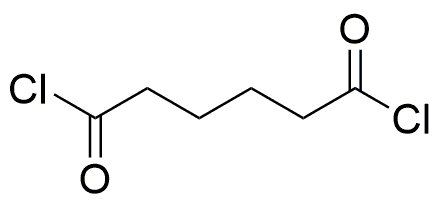Adipoyl chloride is widely utilized in research focused on
- Synthesis of Polyamides: This compound serves as a key intermediate in producing nylon and other polyamides, which are essential in textiles and engineering plastics.
- Production of Esters: It is used to create adipate esters, which find applications as plasticizers in the manufacturing of flexible plastics, enhancing their durability and flexibility.
- Pharmaceutical Chemistry: Adipoyl chloride plays a role in synthesizing various pharmaceutical compounds, aiding in the development of new medications.
- Surface Coatings: This chemical is used in the formulation of coatings that provide improved resistance to chemicals and abrasion, making it valuable in industrial applications.
- Research and Development: In laboratories, it is utilized for creating derivatives that are studied for their potential applications in materials science and organic synthesis.
General Information
Properties
Safety and Regulations
Applications
Adipoyl chloride is widely utilized in research focused on
- Synthesis of Polyamides: This compound serves as a key intermediate in producing nylon and other polyamides, which are essential in textiles and engineering plastics.
- Production of Esters: It is used to create adipate esters, which find applications as plasticizers in the manufacturing of flexible plastics, enhancing their durability and flexibility.
- Pharmaceutical Chemistry: Adipoyl chloride plays a role in synthesizing various pharmaceutical compounds, aiding in the development of new medications.
- Surface Coatings: This chemical is used in the formulation of coatings that provide improved resistance to chemicals and abrasion, making it valuable in industrial applications.
- Research and Development: In laboratories, it is utilized for creating derivatives that are studied for their potential applications in materials science and organic synthesis.
Documents
Safety Data Sheets (SDS)
The SDS provides comprehensive safety information on handling, storage, and disposal of the product.
Product Specification (PS)
The PS provides a comprehensive breakdown of the product’s properties, including chemical composition, physical state, purity, and storage requirements. It also details acceptable quality ranges and the product's intended applications.
Certificates of Analysis (COA)
Search for Certificates of Analysis (COA) by entering the products Lot Number. Lot and Batch Numbers can be found on a product’s label following the words ‘Lot’ or ‘Batch’.
*Catalog Number
*Lot Number
Certificates Of Origin (COO)
This COO confirms the country where the product was manufactured, and also details the materials and components used in it and whether it is derived from natural, synthetic, or other specific sources. This certificate may be required for customs, trade, and regulatory compliance.
*Catalog Number
*Lot Number
Safety Data Sheets (SDS)
The SDS provides comprehensive safety information on handling, storage, and disposal of the product.
DownloadProduct Specification (PS)
The PS provides a comprehensive breakdown of the product’s properties, including chemical composition, physical state, purity, and storage requirements. It also details acceptable quality ranges and the product's intended applications.
DownloadCertificates of Analysis (COA)
Search for Certificates of Analysis (COA) by entering the products Lot Number. Lot and Batch Numbers can be found on a product’s label following the words ‘Lot’ or ‘Batch’.
*Catalog Number
*Lot Number
Certificates Of Origin (COO)
This COO confirms the country where the product was manufactured, and also details the materials and components used in it and whether it is derived from natural, synthetic, or other specific sources. This certificate may be required for customs, trade, and regulatory compliance.


